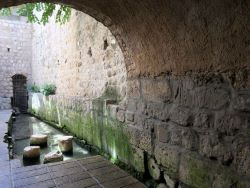THE BREAKING OF BREAD IN SIMON'S HOUSE
There may be those who feel that certain cases of divorce and remarriage (not for “porneia”) cannot be received back into fellowship; that they could never break bread with the offending party no matter what they say, thereby cutting off the sinner from the path to redemption unless “falling into the hand of man” (1 Chronicles 21:13) they were prepared to submit to unscriptural conditions! It remains a marvel of marvels to the writer’s mind that Yahweh, who is so holy, condescended to extend His love toward man and created a plan of salvation that could declare His just claims of righteousness without cutting off, in that very process, the path to redemption of us sinners! It is the comprehension, appreciation and the making plain of these same principles in the life of the disciple that set him/her apart as a friend of the Master. We do well to remember Bro. Thomas’ words in Eureka that the manifestation of the Yahweh Name in Christ with all its glorious attributes of grace and truth, “is only initiated, not completed, in the person of Jesus Christ” (Volume 1 pg. 105).
God’s grace as well as His truth must become integral characteristics of all those who desire to be among that glorious multitude who will comprise the Yahweh name. The Lord warns us in Matthew 7:2, “for with what judgement you judge, ye shall be judged: and with what measure ye mete, it shall be measured to you again”. In our desire to behold the glory of our Lord full of grace and truth, we may have to sit uncomfortably for a time with Simon the Pharisee (Luke 7:36–50). Simon’s problem was not his inability to judge what the truth was when a certain woman, a notorious sinner, came uninvited to his feast and began to wash the Lord’s feet with her tears and wiped them with the hair of her head. His estimation of her was correct; she was a sinner indeed. Simon’s problem was “the grace of God”. The Lord did not cut short this woman’s need to pour out her soul in such a public manner, nor did he hasten to end this period of profound embarrassment that all at that table felt, particularly Simon, who though he had invited the Lord into his house to break bread, had no comprehension at this stage of his life as to what that truly entailed. This incident was recorded that those who would fellowship the Lord Jesus might identify themselves with one of the two classes presented here; the one represented by their spokesman, Simon; the other by this woman who was guilty of “porneia”. Before we proceed we must honestly examine ourselves and ask, to which class do we most closely identify? We have but two choices.
In the parable of the two debtors, the Lord extracted from Simon his judgement of which of the two forgiven debtors loved his lord more. Simon’s answer was a stark lesson in justice, mercy and truth. “‘Do you see this woman? I entered your house; you gave me no water for my feet, but she has wet my feet with her tears and wiped them with her hair. You gave me no kiss, but from the time I came in she has not ceased to kiss my feet. You did not anoint my head with oil, but she has anointed my feet with ointment. Therefore I tell you, her sins, which are many, are forgiven—for she loved much. But he who is forgiven little, loves little.’ And he said to her, ‘Your sins are forgiven.’ Then those who were at the table with him began to say among themselves, ‘who is this who even forgives sins?’ ” (Luke 7:44–49, ESV).
The tears this woman so reverently shed upon those “beautiful feet” (Isaiah 52:7) were tears of inexpressible appreciation for what she believed her Lord could do despite her present “state” described by Simon as that of ‘a sinner’!” Her belief motivated her to do something that took great courage in the presence of Simon’s friends. Though a word was not uttered, for what could she say, burdened with the guilt of iniquity, transgression and sin? Yet her tears constituted one of the greatest confessions in all Scripture. The Lord’s words “her sins which are many are forgiven―for she loved much” provide the divine guidance as to what constitutes scriptural repentance that incurs the blessedness of divine forgiveness.
It is our conviction that long after the Lord and Simon’s other guests had departed, Simon would have sat in the darkness of his room thinking about what the Lord had said, thereby opening Simon’s ears. Simon’s name means, “Hearing.” At times we also need dramatic incidents in our personal and ecclesial lives to open our eyes to behold God’s grace and truth, and our ears to the cry for help. The problems surrounding the divorce and remarriage question may well be circumstances in which the Lord Jesus appeals to us to open our eyes so that we might comprehend what in reality constitutes Yahweh’s truth. Like Simon, we may believe that we see the truth so vividly that we cut off the means of recovery to the repentant sinner, and likewise showing how we have failed utterly to comprehend Yahweh’s grace.
In the Lord’s words and example there is an earnest appeal for the sake of the love of God to search out this subject diligently and pray to Yahweh for guidance to understand what is His will, to perform it ourselves and be empowered in all humility to teach it in a balanced, comprehensive way to others.

